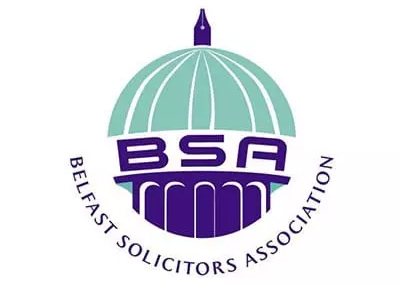Divorce & Family Solicitors
Divorce & Family Solicitors
Family-Related Services
Family-Related Services
We operate throughout Northern Ireland with one of the most experienced family law teams of divorce solicitors. We put your interests first, making sure that you understand the process, the potential costs and the possible outcome. We never take action without explaining the potential costs to you. We pride ourselves on clear, straightforward explanations of potential outcomes and the implications for you.
Our team of specialists help you and your family through the process. Contact us today to start to set your circumstances on a firmer footing.
- Divorce – sensitive, practical and professional advice to help you deal with your situation practically.
- Money and Property – our track record covers straightforward cases and extends to those involving complex and substantial assets. Many commercial law firms aren’t interested in divorce cases, but we readily accept instructions from clients, whatever your level of assets or complexity of arrangements.
Where parties can’t compromise about settling divorce issues, parenthood actions or custody disputes, the courts make a resolution in a procedure called litigation. In litigated family law, one or both parties may hire counsel. Each person can present proof, which the court uses to create orders. Our team of experienced professionals can help you deal with and win these cases.
Putting off making a will is very common. For many people, the thought of making a will at a solicitor’s office is something they prefer to think about another day.
Many people are concerned about the cost of making a will. However, we always recommend you consider it, because of the benefits to you –
- Make sure your next of kin and loved ones receive the money or property you choose
- Leave instructions about how you wish your children to be cared for, should both parents pass away
- Reduce Inheritance Tax amount
- Make specific directions about items with sentimental or financial value, and name the people you choose to have them
- Make charitable donations
- Advise your loved ones about burial or cremation
- Make sure your children inherit, even if your surviving spouse re-marries
- Provide for disabled dependants’ care
On how to Make a Will read more…
Contact either our Belfast office on 02890 453449 or our Ballyclare office on 02893 352221 or email Karen Cox at karen@reidblack.com to discuss making your will.
Whether you are acting as executor or administrator, we advise and support you to deal with issues around estate administration.
You may think you must instruct the solicitor holding the deceased’s will. However, you can choose to instruct any solicitor. Our highly experienced team can answer any questions you have during this difficult time.
We provide initial advice with no obligation. Our approach is sensitive and understanding. If you choose to instruct us, we give you a dedicated point of contact, so that the same person supports you throughout. Please let us help and feel free to contact us with your questions.
Frequently Asked Questions
In any situation of marital breakdown this is often the first question that clients ask. Every divorce is different however we like to break down what can often be a very stressful and intimidating situation for clients into manageable stages.
During the breakdown of a marriage, there are invariably two main strands to be determined; a) the actual divorce b) resolution of the financial assets of the marriage. A common misconception is to merge the actual divorce and the financial case.
Within Northern Ireland family law, there are typically four evidential proofs that can be used to allow a divorce to proceed; 2 years separation with consent; 5 years separation; unreasonable behaviour; adultery. The first two options are referred to as ‘no fault’ basis and typically we would advise that provided everything proceeds as it should, these divorces can be concluded in around 9 months. This will always be contingent upon the speed at which the court processes the various papers that are required to be lodged for the divorce.
The ‘fault’ options of unreasonable behaviour and adultery usually take slightly longer and we would advise clients to allow a period of around 9 months to 1 year for a divorce of this nature to be concluded.
Each case that we deal with at Reid Black Solicitors is assessed and approached on its individual merits. To use the lawyer’s cliché, every case is different. This is no truer than in addressing the financial assets required to be determined following a marriage breakdown.
We always approach the financial cases from a collaborative and practical perspective. Initially, both parties are required to produce financial discovery, which is documentation that essentially gives a comprehensive insight into their financial position and includes items such as; payslips, bank statements, P60’s and pension statements. The discovery is then mutually exchanged with the other party/their legal representatives and negotiations towards a financial settlement can begin.
With our vast experience, we will try to deal with the financial case in as cost effective a manner as possible for our clients and avoid court proceedings were possible. If a resolution can be reached without recourse to court, the financial case will be concluded with the drafting of a matrimonial agreement to be signed by both parties. This agreement will be a full and final enshrinement of the agreed financial settlement. It can be difficult to predict how long negotiations will take however if there is co-operation on both sides we usually estimate financial case (that do not require court intervention) to typically take between 6 and 9 months.
In some scenarios however court intervention in financial cases is inevitable if a resolution cannot be reached. The mechanism by which we deal with these cases is referred to as Ancillary Relief. This requires both parties to lodge written sworn financial statements as evidence which are known as affidavits. The affidavits are lodged with the court and a court hearing date is set, which is referred to as a Financial Dispute Resolution Hearing. This Hearing is conducted by a judge called a Matrimonial Master and it is conducted in an informal and very effective dispute resolution setting at court. The Financial Dispute Resolution Hearing date is provided at the First Directions court date, which clients are not required to attend at and is usually around 4/5 months after this First Directions court date.
In the case of the divorce, if you are the party who ‘petitions’ for divorce, that is begins the process through one of the four evidential proofs, you will be required to attend court. If a divorce proceeds on one of the ‘no fault’ basis, 2 years separation with consent or 5 years separation, it will only be the petitioner who is required to attend court.
In order to save our clients the added expense of a barrister, at Reid Black Solicitors, we would often appear for our clients at court for the ‘no fault’ divorces. Clients can often be daunted by having to appear at court however we make the process as straightforward as possible by guiding our clients through what is required well in advance of the Divorce Hearing.
If a divorce petition is issued on a ‘fault’ basis, unreasonable behaviour or adultery, the non – petitioning party (respondent) has an opportunity to defend the divorce. If this happens then both parties will be required to attend court. ‘Fault’ based divorces usually proceed by way of cross decrees whereby both the petitioning party and respondent obtain a decree on the basis of the other parties unreasonable behaviour.
Shortly after the Divorce Hearing takes place, the court will issue a certificate called a Decree Nisi which will be sent to our office. Six weeks after the Decree Nisi certificate issues we can apply for a certificate called a Decree Absolute which is the document which finalises the divorce. We do not however, as a matter of good practice usually apply for the Decree Absolute until the financial case has been resolved.
Normally in situations of marriage breakdown it becomes untenable for two spouses that are separating to remain living under the same roof, the matrimonial home. Very often the main asset of a marriage is the matrimonial home and clients are very concerned that if they leave the property they will somehow lose their house to the other party.
Whenever a house is owned and lived in by both parties this is absolutely not the case. The claim that a client would be entitled to over a property cannot be diminished simply because they have left the property. Often, for example in situations of domestic violence, it can become unbearable for a spouse to continue to reside with the other party and therefore they have no option other than leaving the property. We work extremely hard to ensure that our clients’ receive the entitlement that they deserve and that is fair and equitable in the eyes of the law.
If a matrimonial home is required to be adjudicated upon there are usually three scenarios that can emerge:-
- One party remains in the property and buys out the interest of the other party.
- The other party remains in the property and buys out the interest of the first party.
- The house is sold and any equity in the property is divided between the parties.
Unfortunately sometimes situations will arise whereby a property is in negative equity and we
ensure that we provide our clients with the best possible advice to deal with same.
In determining what proportion of equity is due to each party, we apply what is referred to as the Article 27 Matrix, which is the technical term for the determinative factors in any financial case of marriage breakdown. The factors to be considered include; the length of the marriage, whether there are any children of the marriage and their ages, the ages of the parties, the contributions made by each party during the course of the marriage and the lifestyle that the parties were accustomed to during the course of the marriage.
We use careful and skilled application of these factors to ensure that our clients achieve the best financial deals possible to protect them now and in the future.
Clients work very hard to build up their pensions throughout their lives in order to ensure that they have financial means to get by during their retirement.
Whenever they are divorcing, there is usually a large degree of apprehension and uncertainty on their part regarding their pensions. From the outset, we at Reid Black Solicitors like to reassure clients that their pension pots will not be decimated or indeed lost altogether.
We are keen to advise early that the only portion of a client’s pension that is taken into consideration throughout the course of a divorce/financial settlement is that which was accrued during the course of the marriage. Any portion of the pension pot that was accrued outside the marriage will not be taken into consideration and can be ring-fenced.
Often in situations of short marriages, pensions may not be taken into account at all, particularly if the pension pots of the respective spouses are similar. In longer marriages, the favoured mechanism for dealing with pensions is by way of equalisation of the pensions. This means that we will look at the respective pension provisions by way of the Cash Equivalent Transfer Value of the pensions and calculate a percentage to ensure that the pension entitlement of each party is equalised. Practically, this is most commonly done by way of a Pension Sharing Order, whereby the spouse with the lesser pension value will receive a pension from within the other spouse’s pension. This will be a stand-alone pension and both pensions will be mutually exclusive.
If a client is very keen not to lose any of their pension and there are other assets within the marriage to be divided, the Cash Equivalent Transfer Value of the pension can be used to offset against other assets, such as any equity entitlement from property owned by the parties, thus ensuring that the pension remains completely intact.
News
PSNI Data Breach: There’s Still Time to Register Your Claim
Admin2024-11-20T15:32:34+00:0020th November, 2024|
The recent PSNI data breach has caused widespread concern among affected individuals. If you believe your data has been compromised, you can still take...
MOD Admits Liability in Noise-Induced Hearing Loss Cases: What This Means for Our Clients
Admin2024-11-18T09:58:38+00:0013th November, 2024|
Recently, headlines have been filled with news about the Ministry of Defence (MOD) admitting liability in noise-induced hearing loss (NIHL) cases following a group...
PSNI Data Breach Cases Update – September 2024
Admin2024-09-27T11:35:57+01:0027th September, 2024|
This matter was listed before the High Court Judge for Review on Tuesday 24th September 2024. Following several meetings and negotiations with the legal...
News and Case Studies

Hearing Loss Claim Against Daintifyt Factory
Miss N from Limavady has been awarded £22,500 in compensation after making a hearing loss claim against Daintifyt. Miss N was employed by Daintifyt for 20 years. Miss N noticed her hearing was reduced...

Hearing Loss Claim Against Herdman’s Mill
Mrs M from Strabane has been awarded £8,900 in compensation after making a hearing loss claim against Herdman’s Mill. Mrs M was employed by Herdmans for 11 years. Mrs M noticed her hearing had...

Hearing Loss Claim Against Herdman’s Mill
Mrs L from Castlederg has been awarded £16,250 in compensation after making a hearing loss claim against Herdman’s Mill. Mrs L was employed by Herdmans in Sion Mills for 13 years. Mrs L noticed...
Client Testimonials
Client Testimonials





















